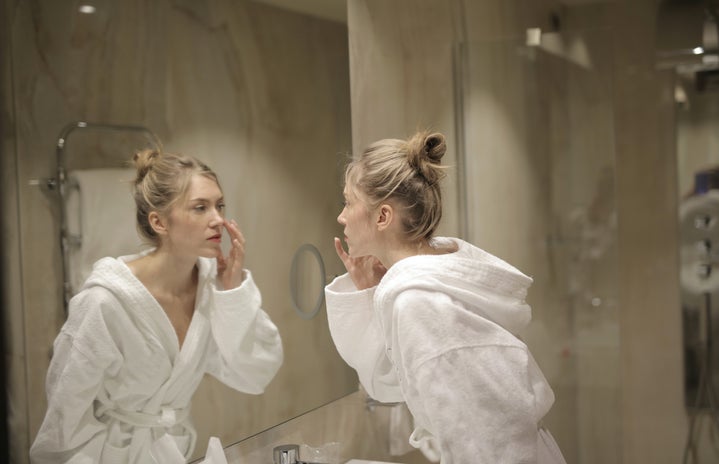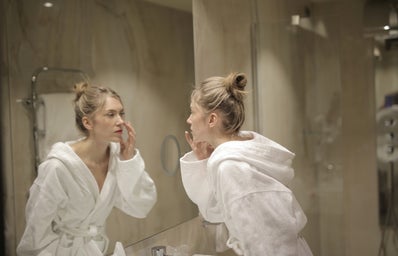This article contains spoilers.
When I arrived at my local AMC to watch “The Substance,” I had no idea what I was walking into. Little did I know that over the next two hours and twenty minutes, I would be forced to reflect on my relationship with my body, and, like a punch to the gut, the film would make me hate myself for every moment in my life that I’ve ever hated myself.
“The Substance,” a 2024 body horror sci-fi film directed by Coralie Fargeat, fiercely draws attention to the foolishness within the beauty standards women are encouraged to live by and the detrimental harm these expectations can cause. Through the film’s campiness, self-awareness and unsettling gory imagery, “The Substance” dismantles, mocks and exposes the impact of the beauty ideals that surround us all, pleading with women everywhere to release themselves from the shackles of their self-hatred.
The film follows Elisabeth Sparkle (Demi Moore), a beloved TV star who was fired on her 50th birthday for being old and washed-up. Saddened by her aging, Elisabeth accepts a mysterious offer to take an underground drug called The Substance, which promises to create a better version of herself that is younger, prettier and more perfect. One injection will release a younger Elisabeth into the world. Elisabeth must switch off with her alternate self, Sue (Margaret Qualley), every seven days to maintain the balance between them.
Elisabeth unhappily analyzes her naked body in the bathroom mirror before taking The Substance, a moment I’ve experienced over and over again in my own life. The difference between experiencing disappointment about my physical appearance and watching Elisabeth do the same was that I felt a wave of sadness and empathy for her that I would never dare extend to myself.
Elisabeth’s back splits open when The Substance kicks in, and her new self is born. Sue stands tall, and during her first week in the world, she auditions to be the face of the TV morning show from which Elisabeth had been fired. Being young, fresh and beautiful, she lands the job and becomes Hollywood’s sweetheart.
When it is Elisabeth’s turn to live again, she holes herself up in her apartment, waiting for Sue’s turn again. Watching Elisabeth’s quality of life diminish reminded me of all the times I got ready for a fun night only to look too hard at myself and, underwhelmed and disappointed with what I saw, decided to stay in bed instead. Here, the film highlights the strong and repressive tie between our self-worth as women and our external qualities. This scene made me hyper-aware of my surrender to societal beauty standards, and it opened my eyes to all the ways that I’ve allowed these ideals to dictate my decisions and my life.
Tired of living in Sue’s shadow, Elisabeth asks an old classmate for drinks. She puts on a red dress and sleek black gloves and does her makeup perfectly, finishing her look with a classic red lip. I thought she looked gorgeous.
What ensued next was one of the film’s most striking and horrific scenes: Elisabeth takes a final look in the mirror before leaving, but she stares a bit too long and begins to identify flaws within herself that she didn’t notice before. Her neck wrinkles were too apparent, so she covered them with a scarf. She adds more concealer to her face and touches up her lipstick. Finally satisfied, she starts to head out the door but rushes back to the bathroom to apply more concealer, more lipstick and more blush until, eventually, she smears her lipstick all across her face, grabs and pulls at her hair hard, takes her gloved hands and aggressively rubs them up and down her face, causing her mascara to smudge all around her eyes.
The theater was quiet as Elisabeth pawed at herself. Elisabeth’s rage as she picked herself apart was so raw. I thought back to getting ready for eighth-grade graduation, senior prom or even a regular day at school, where I would delicately brush my hair or gently apply my mascara but couldn’t quite get all the little details perfect. I remember slowly feeling my blood boil during those times as I redo my hair or attempt to remove the mascara lumps. Eventually, I got so frustrated with myself and my inability to make myself perfect that I’d slam my brush onto the counter, painfully rip my hair tie from my head, or violently scrub the mascara from my eyes with a makeup wipe.
The film hauntingly illuminates the universal experience that women have of struggling to reach an impossible level of perfection that results in self-directed anger and outrage. Seeing myself in Elisabeth reminded me that the real enemy isn’t myself but the societal systems that perpetuate beauty ideals that we will never be able to live up to.
The film’s peak occurs when Sue deliberately chooses to push off the switch with Elisabeth for a prolonged time so she can relish in the limelight. When they finally switch, Elisabeth wakes up in a state of horror: Sue’s breaking of the balance has caused Elisabeth to age rapidly.
Elisabeth injects Sue with a fatal serum to end The Substance experience but has a change of heart and tries to revive her, causing a malfunction that awakens Sue. Enraged, Sue brutally beats Elisabeth to death, screaming at her how ugly she is.
Sue’s killing of Elisabeth was a shocking visual representation of how women shame and talk down to themselves about their bodies and looks. There have been many moments in which I’ve metaphorically beaten myself up for not being skinny enough, pretty enough or having not-white-enough teeth. The film presents this psychological experience to audiences in a highly graphic and physical way, which feels like a slap in the face to witness. This scene took my negative self-perception and made it visually tangible in a terrifying, uncomfortable way, and made me feel empowered to fight against my self-doubts.
With Elisabeth dead, Sue’s beauty deteriorates as she prepares to host her network’s New Year’s Eve special. Desperate, she injects herself with the last of The Substance, but instead of perfection, she transforms into the grotesque Monstro Elisasue. This scene embodies the film’s critique of the endless, destructive pursuit of unattainable beauty, with the unimaginably disfigured Monstro symbolizing the toll of that obsession.
A live audience awaits the arrival of their beautiful star, Sue. They exchange looks of confusion when Monstro takes the stage with its lumpy features placed in the least predictable areas and Elisabeth’s face preposterously plastered on one side of its body. The audience attacks Monstro, and Elisabeth’s face rips from Monstro’s body, free from the chaos of The Substance. The escape of Elisabeth’s face signals a sense of relief from society’s judgment. All that is left of Elisabeth is her head; without a body, she has nothing left that can disappoint nor gratify the critical, reproving eyes of others.
This ending scene reminded me of times when I felt most insecure and aware of my body’s shortcomings and how I’d slip on sweats and an oversized sweatshirt, drowning my body out so that its shape was unidentifiable behind the excess fabric. Hiding behind my clothes was my own way of removing my body, leaving nothing for the world to have an opinion about. Reducing Elisabeth to just a head was the film’s fantastically appalling metaphor for society’s viciousness toward women. It powerfully stresses how toxic beauty ideals have distorted women’s self-perception so profoundly that they are sickeningly driven to wish they had no body at all.
I left the film with a new appreciation for all the parts of myself that I sometimes resent, and I firmly believe that every woman would walk away from “The Substance” with plans to treat themselves more gently. Elisabeth’s transformation into Sue and Sue’s to Monstro Elisasue reflects the life we rob ourselves of when we betray who we are for the illusion of perfection. Our perceived flaws and insecurities are often what make us special, so when we start to throw these parts of ourselves away and change in hopes that we will be something better, all we have left is the shell of a person whose uniqueness has been stripped down and molded into an image-obsessed product of our vain culture. “The Substance” pushed this message down my throat.


